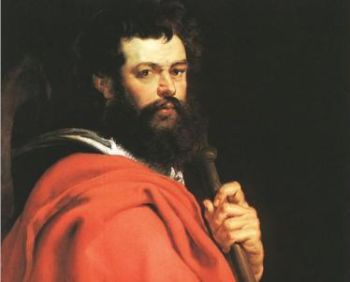
Did you have a nickname growing up? Maybe “Shorty” or “Junior?” Somehow we give nicknames to people that accent a certain feature of their bodies or dispositions.
Today we celebrate the feast day of the Apostle who had a “nickname” attached to him. We call him “James the Less.” There were two James among the Twelve apostles, the more noted being James the son of Zebedee who was one of the three picked by Jesus to accompany him on special occasions. So, to distinguish “James the Less” from the other James, “the Less” was attached to his name. We are not sure why he got this name. Was it because he was not as important as the other James? Probably not, because Jesus warned against trying to be more important than the rest. Maybe it referred to how tall he was; he was the shorter James, rather than the “less important” James.
St. Jerome equated James with the cousin of Jesus mentioned in the gospels, and also as the bishop of Jerusalem. St. Paul singles him out as one whom Jesus visited, personally, after the resurrection (1 Corinthians 15:1-18).
“…he appeared to Cephas, then to the Twelve. After that he appeared to more than five hundred brothers and sisters at once, most of whom are still living, though some have fallen asleep. After that he appeared to James, then to all the Apostles.”
After appearing to Peter personally, Jesus also appears to James personally. We ask, “why James?” Was it because he was Jesus’ cousin, or because he was to be the bishop of Jerusalem? In light of this citation, it would be more appropriate to call this James, “the greater,” rather than Zebedee’s son. I will opt to call this privileged James, “the shorter.”
Together with James, we also celebrate the feast of St. Philip, the apostle. He had a special role at the Last Supper when he tried to pin down Jesus (John 14:6-14).
Jesus said:
“If you know me, then you will also know my Father. From now on you do know him and have seen him.”
Philip didn’t catch on to what Jesus was saying, so he stuck out his neck and asked the question that everyone else was thinking.
“Master, show us the Father, and that will be enough for us.”
Duh. Jesus had just said that if they knew him, then they knew the Father. Seeing the face of Jesus was seeing the face of the Father. Why wasn’t that enough?
In responding to Philip’s comment, Jesus launched a sermon.
“Have I been with you for so long a time, and you still do not know me, Philip? Whoever has seen me has seen the Father. How can you say, ‘Show us the Father?’ Do you not believe that I am in the Father and the Father is in me.”
Jesus and the Father were, and are, one. When we encounter Jesus, we also encounter the Father. Though Philip did not know it, he had seen, touched, and heard God himself revealing himself through his beloved son. What more could Philip ask for so he would have “enough?”
Religions that believe and honor God but do not know Jesus, cannot see the Father. When we encounter Jesus and let him come into our hearts, we begin to know Jesus and experience God’s love working through him. Knowing Jesus is the greatest of all gifts; it is enough. Once we’ve found him, we’ve found the Father, and don’t have to look any further.
Saints James and Philip, pray for us today.
